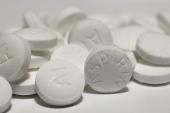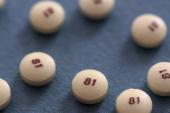Clopidogrel Superior to ‘Divine’ Aspirin Monotherapy in Secondary Prevention
P2Y12 inhibitors reduced the risk of MI by 19%, and researchers say it’s time to move beyond aspirin for long-term use.

More-aggressive antiplatelet therapy with a P2Y12 inhibitor—either clopidogrel or ticagrelor (Brilinta; AstraZeneca)—for secondary prevention is associated with a lower risk of atherothrombotic events compared with aspirin, all without an increased risk of bleeding, a new meta-analysis shows.
Researchers say it’s time physicians move beyond aspirin monotherapy during the chronic phase of treatment for patients with atherosclerotic cardiovascular disease, noting that aspirin has long been considered sacrosanct in this particular area.
“For cardiologists, as well as internists taking care of patients with atherosclerotic cardiovascular disease, once they’ve completed acute treatment with [dual antiplatelet therapy (DAPT)], the question is what should we do long-term?” senior investigator Arman Qamar, MD, MPH (NorthShore University Health System, Evanston, IL), told TCTMD. “We seem to think that if a patient has atherosclerotic disease there’s something divine about aspirin. The dogma is that you have to be on it long-term, but aspirin is not a benign drug.”
Clopidogrel, he added, is a more-potent antiplatelet agent, although there is the worry that its use might lead to more bleeding. However, the most common type of bleeding that clinicians encounter is gastrointestinal bleeding, said Qamar, and aspirin is known to cause gastrointestinal erosion or peptic ulceration. When these bleeds occur, all medications are discontinued, which places patients at a significantly increased risk of atherothrombotic events.
“We think it’s time to move beyond aspirin,” said Qamar. “My practice, generally speaking, has been that if I have a patient who is on dual antiplatelet therapy with aspirin and Plavix and they complete the year, I will take them off aspirin. I continue them on clopidogrel. In the end, though, it’s very important to look at both their thrombotic risk and bleeding risk—that’s what personalized medicine means.”
Giulio Stefanini, MD, PhD (Humanitas University, Milan, Italy), who performed a similar meta-analysis in 2020, said clopidogrel is infrequently used as monotherapy in secondary prevention, something that may be chalked up to tradition or habits amongst physicians.
“People are used to using aspirin, and they’re not keen to change their strategy,” he told TCTMD. “On the other side of it, the evidence still isn’t that convincing. It’s interesting because the findings from this meta-analysis are almost identical to what we published in the Lancet last year. If you look at hard clinical outcomes, there’s a significant reduction in the risk of myocardial infarction, but no difference in terms of mortality. The lack of a translation in overall mortality might somehow raise doubts among the many practitioners about the clinical benefit of this [clopidogrel] alternative.”
The new study was published March 21, 2022, in European Heart Journal Open.
From CAPRIE to HOST-EXAM
Dual antiplatelet therapy with a P2Y12 inhibitor and aspirin is recommended for 12 months in patients who undergo PCI for acute coronary syndrome and for 6 months after PCI in those with stable CAD (DAPT duration is shorter in patients at high risk for bleeding). In the chronic phase of secondary prevention, the clinical guidelines consider clopidogrel an alternative to aspirin monotherapy, but it’s frequently aspirin that’s selected for long-term use.
We think it’s time to move beyond aspirin. Arman Qamar
Recently, the HOST-EXAM study from South Korea investigated clopidogrel versus aspirin monotherapy during the chronic maintenance period after PCI with drug-eluting stents. In that study, as reported by TCTMD, aspirin significantly reduced the risk of a composite endpoint that included all-cause mortality, MI, stroke, readmission for ACS, and BARC-3 or greater bleeding at 24 months.
One of the questions surrounding HOST-EXAM was its design, which was open label, and its generalizability given the Asian patient population. For that reason, the researchers wanted to conduct a meta-analysis to address the question in a broader group of patients.
In total, nine studies with 61,623 patients were included in the meta-analysis. Five of these studies tested clopidogrel monotherapy and four tested ticagrelor against aspirin monotherapy in patients with cardiovascular, cerebrovascular, and peripheral artery disease. The studies ranged from CAPRIE, which was published in 1996, to HOST-EXAM, which was published just last year. The qualifying events for enrolment included stroke (39.5%), ACS (29.9%), chronic coronary syndrome (20.1%), and peripheral artery disease (10.5%).
The risk of MACE—a composite that included stroke, MI, or all-cause mortality—was reduced by 11% among those treated with P2Y12 monotherapy compared with aspirin (RR 0.89; 95% CI 0.84-0.95), a reduction that was consistent irrespective of P2Y12 inhibitor (P = 0.83 for interaction). The reduction in MACE was driven by a significant decrease in MI with P2Y12 monotherapy (RR 0.81; 95% CI 0.71-0.92). There was no significant difference between treatments in the risk of stroke or all-cause mortality. In the subgroup analyses based on the qualifying event, the MACE reduction with P2Y12 inhibitors was largely the result of reducing the recurrence of the primary event.
There was no difference in the risk of major bleeding or any bleeding between P2Y12 inhibitor and aspirin monotherapy, and the risk of major bleeding was similar across all subgroups.
For Stefanini, future clinical guidelines will need to take these new findings into account, stating that both this meta-analysis and theirs showed there was roughly a 20% lower risk of MI when using clopidogrel monotherapy. One of the strengths of the new meta-analysis is that incorporates the large HOST-EXAM study, he said.
“I think P2Y12 inhibitor monotherapy should be considered as good as aspirin, leaving physicians free to choose what would be ideal for their patients, taking into account the risk of bleeding, particularly the risk of gastrointestinal bleeding,” said Stefanini.
Concerns About Nonresponders
In addition to the risk of bleeding with clopidogrel, Qamar said physicians may worry about patient response to the P2Y12 inhibitor. If a patient is known to have a suboptimal response, another P2Y12 inhibitor, such as ticagrelor or even prasugrel, can be considered, he said. Personalized antiplatelet therapy with genotyping and platelet function testing are also options.
“Nonresponders are an important concern, but we have ways around it,” said Qamar. For patients who might need ticagrelor, there are worries about the cost of the drug compared with clopidogrel, but the patent on ticagrelor is set to expire in 2024, he noted.
People are used to using aspirin, and they’re not keen to change their strategy. Giulio Stefanini
In terms of what needs to happen to get clinicians thinking more about clopidogrel monotherapy over aspirin, a randomized clinical trial would be ideal, said Qamar, although he isn’t convinced it’s possible. “The question is who would fund such a trial?” he said. “You’ll need longer follow-up, and clopidogrel is already generic. The [National Institutes of Health] isn’t going to fund it.”
However, a pragmatic clinical trial utilizing electronic health records might be possible, said Qamar, something like the recent trial testing comparative effectiveness of aspirin dosing by the ADAPTABLE investigators.
“Frankly, I would love to see a large-scale randomized, controlled trial,” added Stefanini, although, like Qamar, he’s doubtful it will happen. He said one potential study would be a comparison of aspirin versus P2Y12 inhibition in patients at high ischemic risk, such as those who have diabetes or who underwent a complex revascularization. “It might be that this benefit we see in an overall population would be more pronounced, and we might see a more substantial benefit as it pertains to mortality. I would be interested to see such a trial,” Stefanini said.
Stefanini also noted that the other P2Y12 inhibitors, including prasugrel, will be off patent shortly, so the cost-effectiveness equation will change soon. When that happens, it might be interesting to compare the relative effectiveness of these more-potent antiplatelet agents against aspirin monotherapy in the secondary prevention setting, he said.
Michael O’Riordan is the Managing Editor for TCTMD. He completed his undergraduate degrees at Queen’s University in Kingston, ON, and…
Read Full BioSources
Aggarwal D, Bhatia K, Chunawala ZS, et al. P2Y12 inhibitor versus aspirin monotherapy for secondary prevention of cardiovascular events: meta-analysis of randomized trials. Eur Heart J Open. 2022;Epub ahead of print.
Disclosures
- Qamar reports institutional grant support from Novo Nordisk, NorthShore Auxiliary Research Scholar Fund, NorthShore CardioDiabetes Pilot Grant, and fees for educational activities from the American College of Cardiology, Society for Vascular Medicine, Society for Cardiovascular Angiography and Interventions, Janssen and Janssen, Pfizer, Medscape, and the Clinical Exercise Physiology Association.





Comments